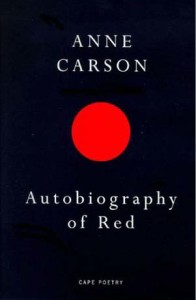“In surfaces, perfection is less interesting,” said Anne Carson, an internationally renowned poet and classical scholar originally from Ontario. “For instance,” she went on, “a page with a poem on it is less attractive than a page with a poem on it and some tea stains.”
Tea stains or no, any page with a poem on it by Carson is bound to be appealing.
Refusing easy categorization, Carson writes essays, novels, and poetry that are all infused with elements of the others.
What makes her work so appealing, besides the pure genius of her poetic turns of phrase, is her ability to wrestle with huge metaphysical concepts in language that is familiar and everyday.
“We’re talking about the struggle to drag a thought over from the mush of the unconscious into some kind of… human sense,” she says about the writing process, and adds that unpretentious language is the best tool for the job. “I think of it as the floor and the walls.”
The analogy of poetic architecture is apt. The narrative language of her books feels like a homey cabin with rare and expensive metaphysical conjectures hung on the walls for decoration.
The Autobiography of Red, subtitled “A Novel in Verse,” is the best and most accessible example of this particular genius. The story, based on an episode from the myth of Heracles, charts the love and heartbreak of Geryon, an artsy gay teenager living in small-town Ontario.
Carson manages to make the strangeness of mythology (Geryon has small red wings tucked underneath his leather jacket) normal, even colloquial. She familiarizes the monstrous, pointing out in the process the monstrosity of the familiar. She places heartwarming teenage angst alongside questions of identity and the ability of language to ever really do what we expect of it.
Anne Carson must-read:
Autobiography of Red
(Lansdowne Library Code: PS 3553 A7667 A94 )

